卷一
- 格式:doc
- 大小:75.00 KB
- 文档页数:5
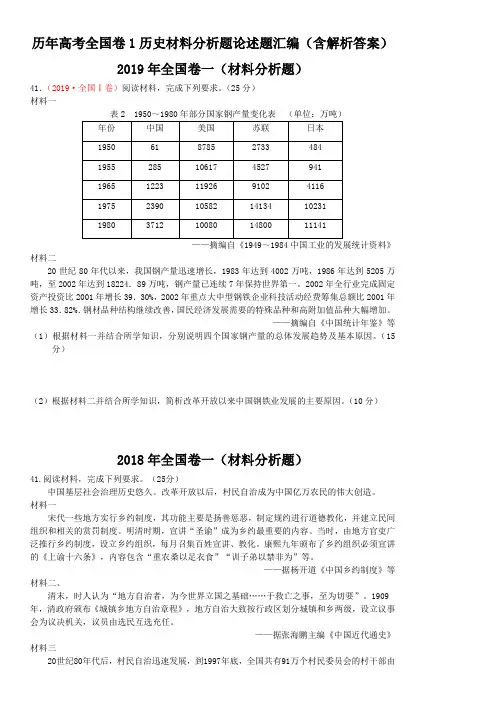
历年高考全国卷1历史材料分析题论述题汇编(含解析答案)2019年全国卷一(材料分析题)41.(2019·全国Ⅰ卷)阅读材料,完成下列要求。
(25分)材料一材料二20世纪80年代以来,我国钢产量迅速增长,1983年达到4002万吨,1986年达到5205万吨,至2002年达到18224.89万吨,钢产量已连续7年保持世界第一。
2002年全行业完成固定资产投资比2001年增长39.30%,2002年重点大中型钢铁企业科技活动经费筹集总额比2001年增长33.82%.钢材品种结构继续改善,国民经济发展需要的特殊品种和高附加值品种大幅增加。
——摘编自《中国统计年鉴》等(1)根据材料一并结合所学知识,分别说明四个国家钢产量的总体发展趋势及基本原因。
(15分)(2)根据材料二并结合所学知识,简析改革开放以来中国钢铁业发展的主要原因。
(10分)2018年全国卷一(材料分析题)41.阅读材料,完成下列要求。
(25分)中国基层社会治理历史悠久。
改革开放以后,村民自治成为中国亿万农民的伟大创造。
材料一宋代一些地方实行乡约制度,其功能主要是扬善惩恶,制定规约进行道德教化,并建立民间组织和相关的赏罚制度。
明清时期,宣讲“圣谕”成为乡约最重要的内容。
当时,由地方官吏广泛推行乡约制度,设立乡约组织,每月召集百姓宣讲、教化。
康熙九年颁布了乡约组织必须宣讲的《上谕十六条》,内容包含“重农桑以足衣食”“训子弟以禁非为”等。
——据杨开道《中国乡约制度》等材料二、清末,时人认为“地方自治者,为今世界立国之基础……于救亡之事,至为切要”。
1909年,清政府颁布《城镇乡地方自治章程》,地方自治大致按行政区划分城镇和乡两级,设立议事会为议决机关,议员由选民互选充任。
——据张海鹏主编《中国近代通史》村民直接选举产生,大部分农村有90%以上的选民参加了选举。
1998年颁布了《中华人民共和国村民委员会组织法》,村民委员会是我国农村基层社会的群众自治组织。
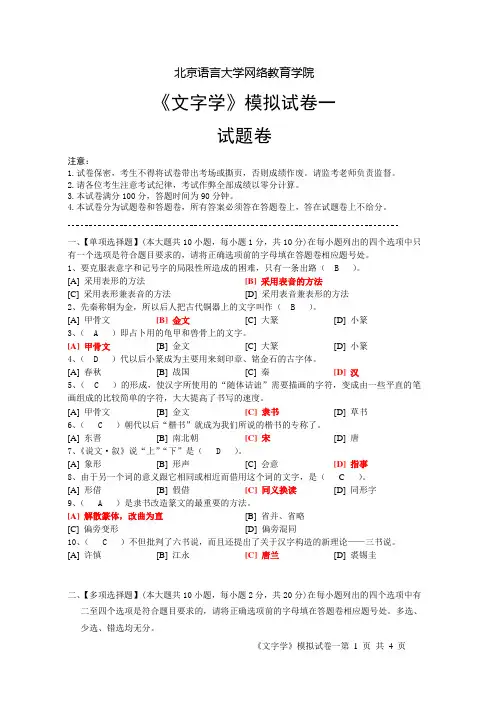
北京语言大学网络教育学院《文字学》模拟试卷一试题卷注意:1.试卷保密,考生不得将试卷带出考场或撕页,否则成绩作废。
请监考老师负责监督。
2.请各位考生注意考试纪律,考试作弊全部成绩以零分计算。
3.本试卷满分100分,答题时间为90分钟。
4.本试卷分为试题卷和答题卷,所有答案必须答在答题卷上,答在试题卷上不给分。
一、【单项选择题】(本大题共10小题,每小题1分,共10分)在每小题列出的四个选项中只有一个选项是符合题目要求的,请将正确选项前的字母填在答题卷相应题号处。
1、要克服表意字和记号字的局限性所造成的困难,只有一条出路( B )。
[A] 采用表形的方法[B] 采用表音的方法[C] 采用表形兼表音的方法[D] 采用表音兼表形的方法2、先秦称铜为金,所以后人把古代铜器上的文字叫作( B )。
[A] 甲骨文[B] 金文[C] 大篆[D] 小篆3、( A )即占卜用的龟甲和兽骨上的文字。
[A] 甲骨文[B] 金文[C] 大篆[D] 小篆4、( D )代以后小篆成为主要用来刻印章、铭金石的古字体。
[A] 春秋[B] 战国[C] 秦[D] 汉5、( C )的形成,使汉字所使用的“随体诘诎”需要描画的字符,变成由一些平直的笔画组成的比较简单的字符,大大提高了书写的速度。
[A] 甲骨文[B] 金文[C] 隶书[D] 草书6、( C )朝代以后“楷书”就成为我们所说的楷书的专称了。
[A] 东晋[B] 南北朝[C] 宋[D] 唐7、《说文·叙》说“上”“下”是( D )。
[A] 象形[B] 形声[C] 会意[D] 指事8、由于另一个词的意义跟它相同或相近而借用这个词的文字,是( C )。
[A] 形借[B] 假借[C] 同义换读[D] 同形字9、( A )是隶书改造篆文的最重要的方法。
[A] 解散篆体,改曲为直[B] 省并、省略[C] 偏旁变形[D] 偏旁混同10、( C )不但批判了六书说,而且还提出了关于汉字构造的新理论——三书说。
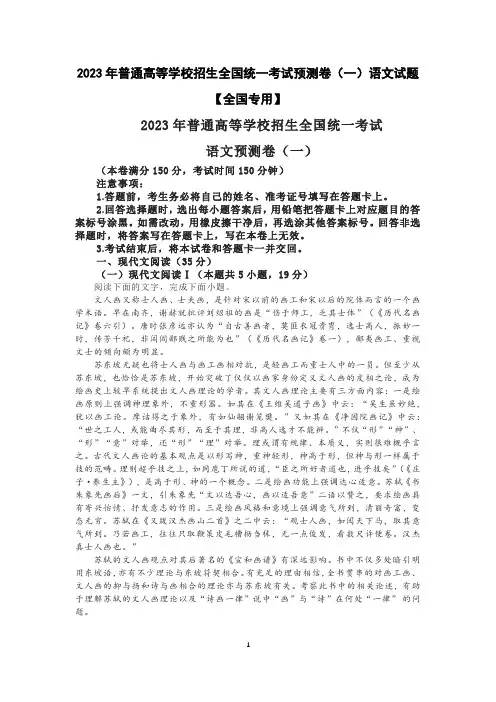
2023年普通高等学校招生全国统一考试预测卷(一)语文试题【全国专用】2023年普通高等学校招生全国统一考试语文预测卷(一)(本卷满分150分,考试时间150分钟)注意事项:1.答题前,考生务必将自己的姓名、准考证号填写在答题卡上。
2.回答选择题时,选出每小题答案后,用铅笔把答题卡上对应题目的答案标号涂黑。
如需改动,用橡皮擦干净后,再选涂其他答案标号。
回答非选择题时,将答案写在答题卡上,写在本卷上无效。
3.考试结束后,将本试卷和答题卡一并交回。
一、现代文阅读(35分)(一)现代文阅读Ⅰ(本题共5小题,19分)阅读下面的文字,完成下面小题。
文人画又称士人画、士夫画,是针对宋以前的画工和宋以后的院体而言的一个画学术语。
早在南齐,谢赫就批评刘绍祖的画是“伤于师工,乏其士体”(《历代名画记》卷六引)。
唐时张彦远亦认为“自古善画者,莫匪衣冠贵胄,逸士高人,振妙一时,传芳千祀,非闾阎鄙贱之所能为也”(《历代名画记》卷一),鄙夷画工、重视文士的倾向颇为明显。
苏东坡无疑也将士人画与画工画相对抗,是轻画工而重士人中的一员。
但至少从苏东坡,也恰恰是苏东坡,开始突破了仅仅以画家身份定义文人画的皮相之论,成为绘画史上较早系统提出文人画理论的学者。
其文人画理论主要有三方面内容:一是绘画原则上强调神理象外,不重形器。
如其在《王维吴道子画》中云:“吴生虽妙绝,犹以画工论。
摩诘得之于象外,有如仙翮谢笼樊。
”又如其在《净因院画记》中云:“世之工人,或能曲尽其形,而至于其理,非高人逸才不能辨。
”不仅“形”“神”、“形”“意”对举,还“形”“理”对举。
理或谓有规律、本质义,实则很难概乎言之。
古代文人画论的基本观点是以形写神,重神轻形,神高于形,但神与形一样属于技的范畴。
理则超乎技之上,如同庖丁所说的道,“臣之所好者道也,进乎技矣”(《庄子·养生主》),是高于形、神的一个概念。
二是绘画功能上强调达心适意。
苏轼《书朱象先画后》一文,引朱象先“文以达吾心,画以适吾意”二语以赞之,要求绘画具有寄兴怡情、抒发意志的作用。
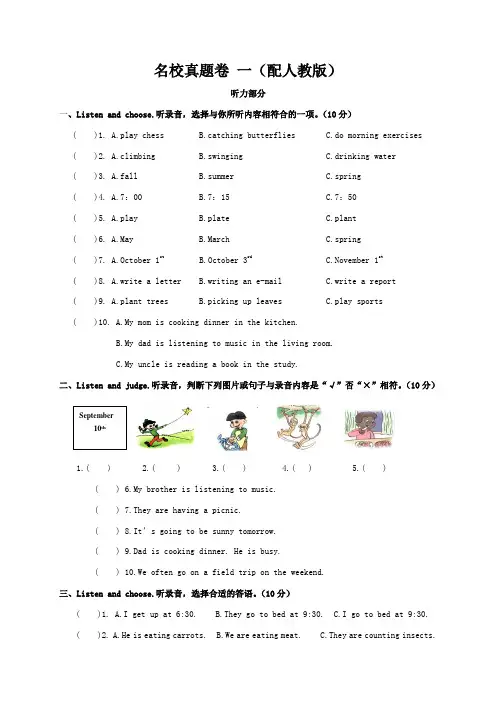
名校真题卷一(配人教版)听力部分一、Listen and choose.听录音,选择与你所听内容相符合的一项。
(10分)( )1. A.play chess B.catching butterflies C.do morning exercises ( )2. A.climbing B.swinging C.drinking water( )3. A.fall B.summer C.spring( )4. A.7:00 B.7:15 C.7:50( )5. A.play B.plate C.plant( )6. A.May B.March C.spring( )7. A.October 1st B.October 3rd C.November 1st( )8. A.write a letter B.writing an e-mail C.write a report( )9. A.plant trees B.picking up leaves C.play sports( )10. A.My mom is cooking dinner in the kitchen.B.My dad is listening to music in the living room.C.My uncle is reading a book in the study.二、Listen and judge.听录音,判断下列图片或句子与录音内容是“√”否“×”相符。
(10分)September10th1.( )2.( )3.( )4.( )5.( )( ) 6.My brother is listening to music.( ) 7.They are having a picnic.( ) 8.It’s going to be sunny tomorrow.( ) 9.Dad is cooking dinner. He is busy.( ) 10.We often go on a field trip on the weekend.三、Listen and choose.听录音,选择合适的答语。
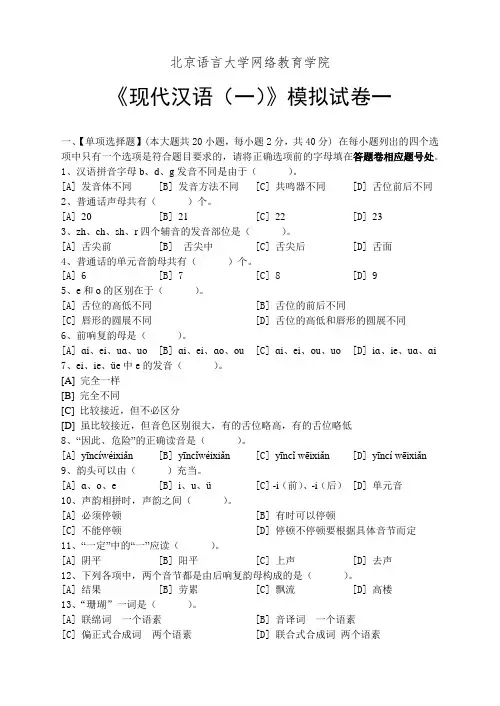
北京语言大学网络教育学院《现代汉语(一)》模拟试卷一一、【单项选择题】(本大题共20小题,每小题2分,共40分) 在每小题列出的四个选项中只有一个选项是符合题目要求的,请将正确选项前的字母填在答题卷相应题号处。
1、汉语拼音字母b、d、g发音不同是由于()。
[A] 发音体不同[B] 发音方法不同[C] 共鸣器不同[D] 舌位前后不同2、普通话声母共有()个。
[A] 20[B] 21[C] 22[D] 233、zh、ch、sh、r四个辅音的发音部位是()。
[A] 舌尖前[B] 舌尖中[C] 舌尖后[D] 舌面4、普通话的单元音韵母共有()个。
[A] 6 [B] 7 [C] 8 [D] 95、e和o的区别在于()。
[A] 舌位的高低不同[B] 舌位的前后不同[C] 唇形的圆展不同[D] 舌位的高低和唇形的圆展不同6、前响复韵母是()。
[A] ɑi、ei、uɑ、uo[B] ɑi、ei、ɑo、ou[C] ɑi、ei、ou、uo[D] iɑ、ie、uɑ、ɑi7、ei、ie、üe中e的发音()。
[A] 完全一样[B] 完全不同[C] 比较接近,但不必区分[D] 虽比较接近,但音色区别很大,有的舌位略高,有的舌位略低8、“因此、危险”的正确读音是()。
[A] yīncíwéixiǎn[B] yīncǐwéixiǎn[C] yīncǐwēixiǎn[D] yīncíwēixiǎn9、韵头可以由()充当。
[A] ɑ、o、e[B] i、u、ü[C] -i(前)、-i(后)[D] 单元音10、声韵相拼时,声韵之间()。
[A] 必须停顿[B] 有时可以停顿[C] 不能停顿[D] 停顿不停顿要根据具体音节而定11、“一定”中的“一”应读()。
[A] 阴平[B] 阳平[C] 上声[D] 去声12、下列各项中,两个音节都是由后响复韵母构成的是()。
[A] 结果[B] 劳累[C] 飘流[D] 高楼13、“珊瑚”一词是()。
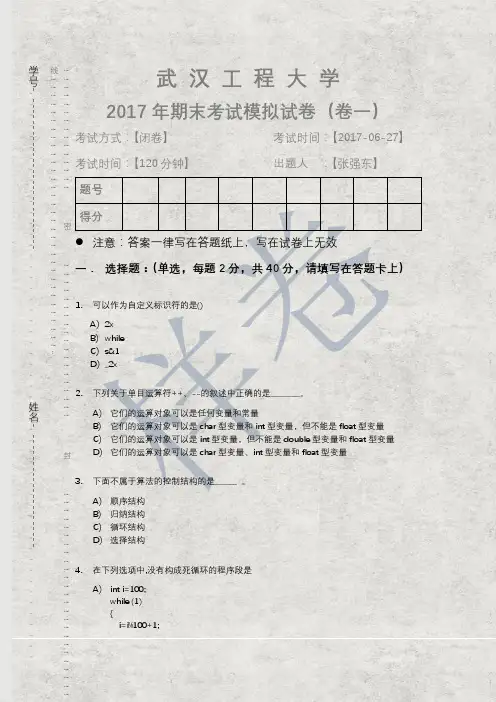
武 汉 工 程 大 学2017年期末考试模拟试卷(卷一)考试方式:【闭卷】 考试时间:【2017-06-27】 考试时间:【120分钟】 出题人 :【张强东】题号 得分注意:答案一律写在答题纸上,写在试卷上无效一. 选择题:(单选,每题2分,共40分,请填写在答题卡上)1. 可以作为自定义标识符的是() A) 2x B) while C) s&1 D) _2x2. 下列关于单目运算符++、--的叙述中正确的是________。
A) 它们的运算对象可以是任何变量和常量B) 它们的运算对象可以是char 型变量和int 型变量,但不能是float 型变量 C) 它们的运算对象可以是int 型变量,但不能是double 型变量和float 型变量 D)它们的运算对象可以是char 型变量、int 型变量和float 型变量3. 下面不属于算法的控制结构的是______ 。
A) 顺序结构 B) 归纳结构 C) 循环结构 D) 选择结构4. 在下列选项中,没有构成死循环的程序段是A) int i=100;while (1) {i=i%100+1;………………………………………密…………………………………………………封…………………………………………………………………线………………………………………………………………………………………..学号-----------------------------姓名----------------------if (i>100) break;}B)for( ; ; );C)int k=1000;do {++k;} while (k>=1000);D)int s=36;while (s) --s;5.下列程序执行后的输出结果是main() int a[3][3],*p,i;p=&a[0][0];for(i=1;i<9;i++)p[i]=i+1;printf("%d\n",a[1][2]);A)3B)6C)9D)随机数6.下列叙述中错误的是________。
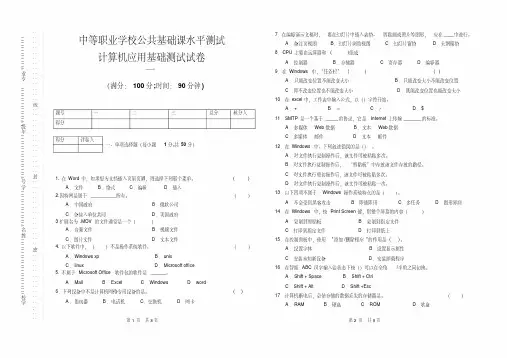
第1 页共8页第2 页共8页中等职业学校公共基础课水平测试计算机应用基础测试试卷一(满分:100分;时间:90分钟)题号一二三总分核分人得分1. 在Word 中,如果想为文档插入页眉页脚,则选择下列那个菜单。
( )A .文件B .格式C .编辑D .插入2.因特网是属于所有。
()A .中国政府B .微软公司C .各接入单位共同D .美国政府3扩展名为.MOV 的文件通常是一个()A .音频文件B .视频文件C .图片文件D .文本文件4. 以下软件中,()不是操作系统软件。
()A .Windows xpB .unixC .linuxD .Microsoft office5. 不属于Microsoft Office 软件包的软件是______。
A .MailB .ExcelC .WindowsD .word6.下列设备中不是计算机网络专用设备的是。
( )A .集线器B .电话机C .交换机D .网卡7.在编辑演示文稿时,要在幻灯片中插入表格、剪贴画或照片等图形,应在____中进行。
A .备注页视图B .幻灯片浏览视图C .幻灯片窗格D .大纲窗格8.CPU 主要由运算器和()组成A .控制器B .存储器C .寄存器D .编辑器9.在Windows 中,“任务栏”()( )A .只能改变位置不能改变大小B .只能改变大小不能改变位置C .即不改变位置也不能改变大小D .既能改变位置也能改变大小10.在excel 中,工作表中输入公式,以()字符开始。
A .+B .=C .?D .$11.SMTP 是一个基于_____的协议,它是Internet 上传输_______的标准。
A .多媒体Web 数据B .文本Web 数据C .多媒体邮件D .文本邮件12.在Windows 中, 下列叙述错误的是()。
A .对文件执行复制操作后,该文件可被粘贴多次。
B .对文件执行复制操作后,“剪贴板”中存放该文件存放的路径。
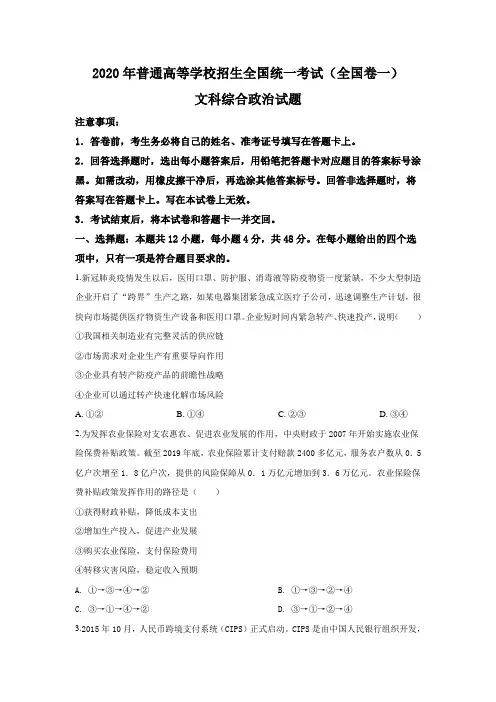
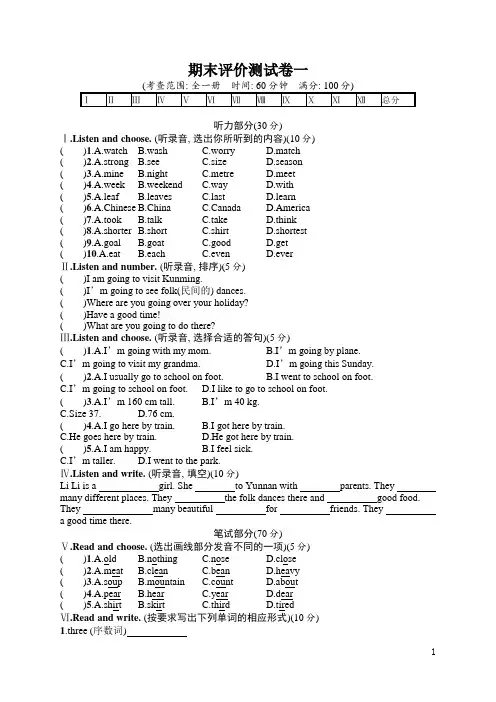
期末评价测试卷一(考查范围: 全一册时间: 60分钟满分: 100分) ⅠⅡⅢⅣⅤⅥⅦⅧⅨⅩⅪⅫ总分听力部分(30分)Ⅰ.Listen and choose.(听录音,选出你所听到的内容)(10分)()1.A.watch B.wash C.worry D.match()2.A.strong B.see C.size D.season()3.A.mine B.night C.metre D.meet()4.A.week B.weekend C.way D.with()5.A.leaf B.leaves st D.learn()6.A.Chinese B.China C.Canada D.America()7.A.took B.talk C.take D.think()8.A.shorter B.short C.shirt D.shortest()9.A.goal B.goat C.good D.get()10.A.eat B.each C.even D.everⅡ.Listen and number.(听录音,排序)(5分)()I am going to visit Kunming.()I’m going to see folk(民间的) dances.()Where are you going over your holiday?()Have a good time!()What are you going to do there?Ⅲ.Listen and choose.(听录音,选择合适的答句)(5分)()1.A.I’m going with my mom. B.I’m going by plane.C.I’m going to visit my grandma.D.I’m going this Sunday.()2.A.I usually go to school on foot. B.I went to school on foot.C.I’m going to school on foot.D.I like to go to school on foot.()3.A.I’m 160 cm tall. B.I’m 40 kg.C.Size 37.D.76 cm.()4.A.I go here by train. B.I got here by train.C.He goes here by train.D.He got here by train.()5.A.I am happy. B.I feel sick.C.I’m taller.D.I went to the park.Ⅳ.Listen and write.(听录音,填空)(10分)Li Li is a girl. She to Yunnan with parents. They many different places. They the folk dances there and good food. They many beautiful for friends. Theya good time there.笔试部分(70分)Ⅴ.Read and choose.(选出画线部分发音不同的一项)(5分)()1.A.old B.nothing C.nose D.close()2.A.meat B.clean C.bean D.heavy()3.A.soup B.mountain C.count D.about()4.A.pear B.hear C.year D.dear()5.A.shirt B.skirt C.third D.tiredⅥ.Read and write.(按要求写出下列单词的相应形式)(10分)1.three (序数词)2.short (比较级)3.easy (反义词)4.do (第三人称单数)5.early (比较级)6.those (单数)7.have (过去式)8.gift (复数)9.her (名词性物主代词)10.fix (过去式)Ⅶ.Look and write.(看图,补全句子)(10分)1.Amy with her friends last Sunday.2.My father and I in Xinjiang last year.3.Wu Yifan in the river next weekend.4.Look! He now.Ⅷ.Choose the best answer.(选择最佳答案)(10分)()1.— cat do you like?—The white one.A.WhichB.WhatC.WhoD.When()2.There no gym in my school ten years ago.A.isB.wasC.areD.were()3.I’m 36 kg and my sister is 58 kg. She is 22 kg than .A.heavy; meB.heavier; myC.heavier; meD.heavier; mine()4.His feet are bigger than .A.myB.mineC.yourD.her()5.— did you do yesterday?—I visited my teacher.A.WhereB.WhenC.WhatD.How()6.— did you go this morning?—I went to the park.A.WhereB.WhenC.WhatD.How()7.— are you going with?—I am going with my friends.A.WhatB.WhereC.WhoD.Whose()8.I got a book Thomas Edison.A.aboutB.underC.atD.in()9.He sad today.A.seeB.watchC.lookD.looks()10.—How is your little brother?—He is 1.50 metres.A.oldB.tallC.heavyD.big1.— is it? —It’s thirty dollars and twenty cents.2.—do you want to drink? —I want to drink some juice.3.— apples do you want? —I want three.4.— are your shoes? —Size 38.5.— do you feel? —I feel tired.Ⅹ.Read and write.(按要求完成句子)(10分)1.I am going to take a picture tomorrow. (对画线部分提问)2.I went to Beijing last month. (对画线部分提问)3.had, they, race, last, a, weekend (.)(连词成句)4.Did you go to school yesterday? (作肯定回答)5.I read English every day. (用she替换I)Ⅺ.Read and choose.(阅读短文,选择最佳答案)(10分)The telephone rang(铃响) and Amy, a four-year-old girl answered it. “May I speak to Mrs Black, please?” a man asked.“I’m afraid you’ve got the wrong number(恐怕你拨错号码了),” Amy said.“I’m sorry,” the man said.After a few minutes, the telephone rang again and Amy answered it. It was the same man. He made the mistake(错误) again. Three minutes later, the telephone rang once more, but Amy didn’t answer it this time. It rang and rang. Her mother heard the ringing. “Why don’t you answer the phone, Amy?”she asked. “Oh, all right,”Amy said, “I’m sure it’s that man again.”But she was wrong. It was her father and he was getting very angry.()1.Who was the man at first?A.Mr Black.B.Mr Brown.C.Amy’s father.D.We don’t know.()2.How old was Amy?A.She was five years old.B.She was four years old.C.She was six years old.D.We don’t know.()3.The man wanted to speak to .A.Mr BlackB.Mrs BlackC.Amy’s fatherD.Amy’s mother()4.At the end of(在……末尾) the story, made the phone call.A.the manB.AmyC.Amy’s fatherD.Amy’s mother()5.Who made a mistake at last?A.Amy.B.The man.C.Mrs Black.D.Amy’s father.Ⅻ.Writing practice.(小作文)(10分)上周末, 陈杰和她的好朋友骑车去了自然公园。

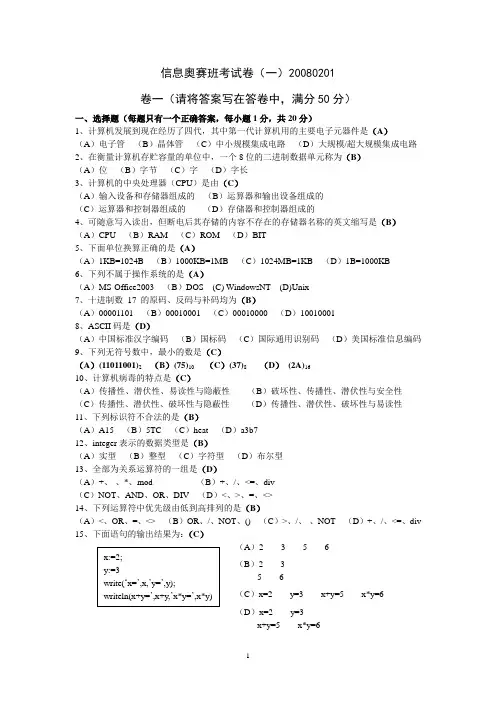
信息奥赛班考试卷(一)20080201卷一(请将答案写在答卷中,满分50分)一、选择题(每题只有一个正确答案,每小题1分,共20分)1、计算机发展到现在经历了四代,其中第一代计算机用的主要电子元器件是(A)(A)电子管(B)晶体管(C)中小规模集成电路(D)大规模/超大规模集成电路2、在衡量计算机存贮容量的单位中,一个8位的二进制数据单元称为(B)(A)位(B)字节(C)字(D)字长3、计算机的中央处理器(CPU)是由(C)(A)输入设备和存储器组成的(B)运算器和输出设备组成的(C)运算器和控制器组成的(D)存储器和控制器组成的4、可随意写入读出,但断电后其存储的内容不存在的存储器名称的英文缩写是(B)(A)CPU (B)RAM (C)ROM (D)BIT5、下面单位换算正确的是(A)(A)1KB=1024B (B)1000KB=1MB (C)1024MB=1KB (D)1B=1000KB6、下列不属于操作系统的是(A)(A)MS-Office2003 (B)DOS (C) WindowsNT (D)Unix7、十进制数17 的原码、反码与补码均为(B)(A)00001101 (B)00010001 (C)00010000 (D)100100018、ASCII码是(D)(A)中国标准汉字编码(B)国标码(C)国际通用识别码(D)美国标准信息编码9、下列无符号数中,最小的数是(C)(A)(11011001)2(B)(75)10(C)(37)8(D)(2A)1610、计算机病毒的特点是(C)(A)传播性、潜伏性、易读性与隐蔽性(B)破坏性、传播性、潜伏性与安全性(C)传播性、潜伏性、破坏性与隐蔽性(D)传播性、潜伏性、破坏性与易读性11、下列标识符不合法的是(B)(A)A15 (B)5TC (C)heat (D)a3b712、integer表示的数据类型是(B)(A)实型(B)整型(C)字符型(D)布尔型13、全部为关系运算符的一组是(D)(A)+、-、*、mod (B)+、/、<=、div(C)NOT、AND、OR、DIV (D)<、>、=、<>14、下列运算符中优先级由低到高排列的是(B)(A)<、OR、=、<> (B)OR、/、NOT、() (C)>、/、-、NOT (D)+、/、<=、div 15、下面语句的输出结果为:(C)(A)2 3 5 65 6(C)x=2 y=3 x+y=5 x*y=6(D)x=2 y=3x+y=5 x*y=616、在Pascal语言中,判断整数a等于0或b等于0的正确的条件表达式是(A)(A)(a=0)or(b=0)(B)not ((a<>0) and (b=0))(C)not ((a=0) and (b=0)) (D)(a=0) and (b=0)17、下列布尔表达式错误的是(C)(A)24<24 (B)24<35<46 (C)a and not or b (D)(4>9) or not (17-3<14-5)18、“27 MOD 4”的运算结果为(B)19、“sin2(x+0.5)”可用PASCAL表达式表达为(A)(A)sin(x+0.5)*sin(x+0.5) (B)sin(x+0.5)*2(C)sin(x+0.5)*(x+0.5) (D)sin((x+0.5)*(x+0.5))20、执行右边方框中PASCAL语句,当x=80时, 运行的结果为(C)(A)5 (B)200 (C)y=5 (D)y=200二、填空题(每格1分,共30分)1、世界上第一台数字式电子计算机是在_美国_国研制的,取名为_ENIAC(埃尼阿克)_。
管理学模拟试卷一注意:1.本试卷共8页;考试时间100分钟2.姓名.学号等必须写在指定地方3.本考卷适用专业年级:管理类专业4.出卷老师:周老师题号一二三四五六总分得分(以上内容为阅卷教师填写)专业________________年级____________班级_____________学号_________________姓名____________请仔细阅读以下内容:1.考生必须遵守考试纪律,本人已经阅读并清楚了解《考试纪律规定》。
2.所有考试材料不得带离考场。
3.考生进入考场后,须将学生证或身份证放在座位的左上角。
4.考场内不许抽烟、吃食物、喝饮料。
5.考生不得将书籍、作业、笔记、草稿纸带入考场,主考教师允许带入的除外。
6.考试过程中,不允许考生使用通讯工具。
7.开考15分钟后不允许考生进入考场,考试进行30分钟后方可离场。
8.考生之间不得进行任何形式的信息交流。
9.除非被允许,否则考生交卷后才能离开座位。
10.考试违纪或作弊的同学将被请出考场,其违纪或作弊行为将上报学院。
本人郑重承诺:我已阅读上述10项规定,如果考试时违反了上述10项规定,本人将自愿接受学校按照有关规定所进行的处理。
上面姓名栏所填姓名即表示本人已阅读本框的内容并签名。
一、单选题(本大题共15小题,每小题2分,共30分)1.管理者在处理与组织成员和其他利益相关者的关系时,他们就在扮演()。
A.人际角色B.信息角色C.决策角色2.在()中,管理者处理信息并得出结论。
A.人际角色B.信息角色C.决策角色3.根据计划的明确性,可以把计划分类为()。
A.长期计划和短期计划B.战略性计划和战术性计划C.具体性计划和指导性计划D.程序性计划和非程序性计划4.在同不合作的供应商进行谈判的时候,管理者扮演的是()。
A.企业家角色B.干扰应对者角色C.资源分配者5.()是日常工作中为提高生产效率、工作效率而作出的决策,牵涉范围较窄,只对组织产生局部影响。
月考评价测试卷一听力部分(40分)Ⅰ.Listen and circle.(听录音,圈出与所听内容相符的图片。
)(10分) 1.2.3.4.5.Ⅱ.Listen and judge.(听录音,判断句子对“√”错“×”。
)(10分)() 1.We have a new art room.() 2.The computer room is on the first floor.() 3.It’s 2 o’clock. Let’s play football.() 4.It’s time to go to school.() 5.It’s time for dinner.Ⅲ.Listen and match.(听录音,连线。
)(10分)Ⅳ.Listen and choose.(听录音,选择正确的答语。
)(10分)()1.A.It’s on the first floor. B.I like the canteen.()2.A.Yes, they are. B.Yes, it is.()3.A.Yes, it’s a book. B.Yes, they are.()4.A.Yes, we do. B.Yes, we are.()5.A.Yes, it is. B.It’s nine o’clock.笔试部分(60分)Ⅴ.Read and choose.(选出不同类的一项。
)(5分)()1.A.library B.playground C.three ()2.A.four B.first C.forty-five()3.A.garden B.lunch C.dinner ()4.A.music B.class C.art ()k B.rice C.dance Ⅵ.Choose the best answer.(选择最佳答案。
)(15分)()1.—What time is it now?—A.That’s fine.B.It’s 7:45.C.It’s time to go to school.()2.—Let’s go home.—!A.OKB.Thank youC.Bye()3.It’s time class.A.for musicB.to musicC.on music()4.School is .A.forB.upC.over()5.—Is this a music room?—No, .A.is itB.it isC.it isn’t()6. is the art room?A.WhoB.What timeC.Where()7.Our computer room is the second floor.A.inB.onC.under()8.How many are there in your school?A.gymsB.gardenC.playground()9.It’s time play football.A.forB.atC.to()10.—Do you have art room?—Yes, we do.A.aB.anC.theⅦ.Read and write.(按要求完成句子。
数控车床操作工技师理论知识测试卷一姓名成绩1、考试时间:120分钟。
2、请首先按要求在试卷的标封处填写您的姓名、准考证号和所在单位的名称。
填空题(第1~20题。
请将正确答案填入题内空白处。
每题1、0分,共20分)1、数控机床一般由程序、输入输出装置、、伺服系统、检测反馈系统及机床本体组成。
2、工艺基准是在工艺过程中所采用的基准 , 可分为工序基准、、测量基准和装配基准。
3、锥度的标注符号所示方向应与锥度方向。
4、齿轮啮合的正确条件是压力角相等 , 相等。
5、粗车刀的主偏角选得太小,切削时容易产生。
6、安装车刀时,刀杆在刀架上的伸出量一般不应超过_____ ___的1.5倍。
7、AutoCAD中用户自定义线型的命令是。
8、在自动编程中,根据不同数控系统的要求,对编译和数学处理后的信息进行处理,使其成为数控系统可以识别的代码,这一过程称为______________。
9、弹性变形和塑性变形都引起零件和工具的的改变。
10、数控机床的精度主要按精度、几何精度和工作精度等项目进行评价。
11、MTBF是指系统的。
12、为保持千分尺精度,使用完毕后,应。
13、在其它条件相同的情况下,包角越大,带传动所能传递的功率。
14、设计夹具时,夹紧力的作用点应尽量在工件刚性的部位,以防止工件产生较大的变形。
15、采用陶瓷刀具精加工铝合金时,刀具磨损。
16、几何造型中不属于二次曲线的曲线有。
17、工艺系统由切削力大小变化引起加工误差称为。
18、单作用式叶片泵 , 若泵的输出压力增加时 , 其排量将。
19、步进电动机定子绕组通电状态的决定了步进电动机转子的角位移。
20、全过程的质量管理必须体现两个思想,第一是预防为主,第二是。
二、选择题(第21~40题。
请选择一个正确答案,将相应字母填入括号内。
每题1分,共20分)21、对刀具寿命影响最大的是 ( ) 。
A 、背吃刀量B 、进给速度C 、切削速度 D、切削液22、下列一组公差带代号 ,可与基准孔φ 42H7 形成间隙配合的是 ( )A 、φ 42g6B 、φ 42n6C 、φ 42m6D 、φ 42s623、下列哪项不是图形输入设备的功能:( )A、把图像送入计算机B、修改图形C、删除图形D、打印图形24、在标准蜗杆传动中,蜗杆头数z1一定时,若增大蜗杆直径系数q,将使传动效率()。
四年级英语测试卷一一、选出每组单词中不同类的一项。
()1、A.father B.mother C.book()2、A.watch B.talk C.these()3、A.picture B.take C.read()4、A.writing B.read C.swimming()5、A.China B.Sam C.Amy()6、A.football B.basketball C.picture()7、A.elephant B.jump C.tiger()8、A.morning B.playing C.drawing()9、A.row B.interesting C.play()10、k B.boat C.car二、单项选择。
( )1.The dog ______ lost. A. is B. are C. am( )2.I______ No.2 West Lake Roa A. live at B. live on C. live in ( )3.My home is ______ the supermarket. A.on B.at C.near( )4.This ______ my sister,Amy She ________ watching TV.A.is,areB.are,isC.is,is( )5.My sister is playing ____ her toy train. A.with B.to C.at ( )6.—What are they doing? —_____________.A.They’re near the window.B.They’re reading books.C.They’re blue pencils.( )7._________ the elephants doing? _________ drawing pictures.A.What’s,It’sB.What,They’reC.What are,They’re ( )8.Look ______ the little girl under the tree.A.atB.toC.with( )9.My grandpa is _______ taijiquan in the park.A.doB.playC.doing( )10.Look at the boys ___the big trees A.on B.for C.between三、根据问句选择答语。
全国新高考一卷语文试卷
全国新高考一卷语文试卷
一、阅读题
今年全国新高考语文试卷中的阅读题相较于去年有所不同,共分为两
部分。
在第一部分中,主要是一篇政治题材的文章,涉及到了民族复
兴和革命历史。
第二部分则是一篇文学类的文章,题材为唐代诗人杜
甫的名篇《登高》。
整体难度适中,偏重考察学生对社会现象和文学
作品的理解和分析能力。
二、文本材料题
本卷一共有三道文本材料题目,分别是《红楼梦》中的一段对白,明
代杂剧《汉宫秋》中的一段剧情,以及现代小说《平凡的世界》的片段。
该部分题目较难,需要对文本素材有很深入的理解和熟练的运用。
三、作文题
本次作文题目是“假如我是一棵树”,需要考生综合运用语文知识、良
好的想象和表达能力,写出一篇文笔流畅、内容丰富的作文。
四、词语填空题
词语填空部分延续了去年的趋势,依旧含有一定的生僻词和熟词不知
义(生熟词)单词考查。
题目比较有趣,需要考生在较短的时间内运
用对语言的敏锐洞察力和广泛的词汇积累填空。
五、写作技能题
写作技能题是本次试卷中最为独特和出色的部分,开放式的问题设置
使其更加注重考查同学的思辨能力和专业素养。
该部分题目涵盖了古
文阅读、写作素养、习作技巧等多个层面,更加贴近语文教育的本质。
总之,此次全国新高考一卷语文试卷整体难度适中,相比去年更为注
重对学生基础和实力的考查。
同时,试卷涵盖了全方位的语文知识和
能力要求,对于中学生的语文素养培养具有积极推动作用。
《管理学基础》试卷(一)一、单项选择题(1-20题,每题1分,共20分。
每小题只有一个最恰当的答案,请将所选答案的相应字母写在括号内)1、被誉为“科学管理之父”的是( )。
A、法约尔B、泰勒C、韦伯D、梅奥2、美国学者梅奥通过研究发现,企业中的职工有社会和心理方面的需求,属于( )。
A、经济人B、理性人C、社会人D、自私人3、需要层次论认为,人的最低层需要是( )。
A、生理需要B、安全需要C、尊重需要D、社交需要4、美国学者赫茨伯格关于管理的双因素理论的“双因素”是指( )。
A、激励因素和惩罚因素B、正式组织因素和非正式组织因素C、保健因素和激励因素D、保健因素和风险因素5、目标管理的基本精神是( )。
A、以自我管理为中心B、以监督控制为中心C、以岗位设置为中心D、以人员编制为中心6、风险型决策的方法很多,最常用的是( )。
A、提喻法B、决策树法C、创造工程法D、定性分析法7、在非确定型决策中,从各个较低收益或较高损失的方案中,选出一个收益最高或损失最小的方案,这就是( )。
A、遗憾准则B、等概率准则C、悲观准则D、乐观准则8、管理层次与管理幅度间的大小数量关系是( )。
A、正比关系B、反比关系C、几何级数关系D、算术级数关系9、由按职能划分的部门和按项目或产品划分的部门结合而形成的组织结构形式是( )。
A、参谋型B、矩阵型C、职能型D、直线型10、以下不属于领导艺术特点的是()。
A、创造性B、经验性C、科学性D、多样性11、在“管理方格法”中,(9,1)方格被称为()。
A、贫乏式领导B、任务式领导C、俱乐部式领导D、战斗集体式领导12、随着信息传递的环节增多,()方式沟通失真的潜在可能性就会增大。
A 、口头方式B、书面方式C、非语言方式D、电子媒介方式13、在控制类型中,工作完成以后所进行的控制是()A、事前控制B、事中控制C、事后控制D、作业控制14、作为激励过程的一个重要环节,强化可以划分为()和自然消退三种类型。
广东省2014—2015学年度第一学期八年级英语单元测试题(一)(Unit1满分:100分,时间:45分钟)Class:_____________ Name:______________ Score:______________一、听力理解(本大题分为A、B、C三部分,共15小题,每小题1分,共15分)A. 听对话选答案。
对话听两遍。
(共5小题,每小题1分,满分5分)听第一段材料,回答第1—2小题。
( )1. Where did Jimmy go on vacation?A. Beijing.B. New York.C. Sydney.( )2. Who did he go with?A. His friends.B. His father.C. His mother.听第二段材料,回答第3—5小题。
( )3. How was Cindy’s vacation?A. Great.B. Boring.C. Terrible.( )4. Where did she go?A. Paris.B. Hong Kong.C. Shanghai.( )5. Did she buy anything?A. Yes, she did.B. No, she didn’t.C. We don’t know.B.听短文(本题有5小题,每小题1分,共5分)听短文,在每小题给出的三个选项中,选出一个能完成句子的最佳答案。
短文听两遍。
( )6. Bill went to ________ on his vacation.A. a parkB. a zooC. a farm( )7. Bill went there with ________.A. his friendsB. his parentsC. his sisters( )8. Bill thinks everything was ________.A. interestingB. relaxingC. terrible( )9. Bill saw ________ on his vacation.A. pandasB. hens and pigsC. all kinds of animals( )10. Bill ________ in the evening.A. readB. did his homeworkC. played computer gamesC. 听填信息(本题有5小题,每小题1分,共5分)【八年级英语单元测试题(一)第1 页共4 页】在每小题的四个选项中,选出可以填入空白处的最佳选项,并把答案写在题前的括号内。
( )16. —Where did you go ______ vacation, Lana?—I went to Sanya ______ my family.A. of; withB. of; forC. on; withD. on; of( )17. —Hi, Helen. _______. —Hi, Rick. Yes, I took a vacation last month.A. ByeB. ThanksC. SorryD. Long time no see ( )18. It’s my first time to come to Zhanjiang, so_______ here is reall y interesting for me.A. everythingB. nothingC. someoneD. anywhere( )19. —What did you do on your uncle’s farm, Sally?—I _______ the horse and _______ some hens there.A. ride; feedB. rode; fedC. rode; feedD. ride; fed( )20. —_____ was your vacation in Xiamen, Joe?—It was ______. I want to go there again.A. How; boringB. What; boringC. How; wonderfulD. How about; wonderful ( )21. When I listen to the music, I ________ I’m walking on the beach.A. find outB. wait forC. think ofD. feel like( )22. —Did _______ go skating with Mary? —______. She went there alone (独自).A. someone; No oneB. anyone; No oneC. someone; AnyoneD. anyone; Anyone ( )23. It was a fine day yesterday, so we decided _______ beach volleyball.A. playB. playedC. playingD. to play( )24. ______ th e bad weather, we couldn’t see ______.A. Because; somethingB. Because; anythingC. Because of; anythingD. Because of; something( )25. I couldn’t find my schoolbag _______. Did you see it?A. anywhereB. nowhereC. someplaceD. somewhere( )26. I bought something for my parents, but nothing for ______.A. IB. myC. mineD. myself( )27. —There will be ______ on TV today. —Oh? What will it be?A. exciting somethingB. something excitingC. exciting everythingD. everything exciting( )28. There are ______ apples in the basket and you don’t need to buy any.A. littleB. a littleC. a fewD. few( )29. We had fun. No one _______ to be bored.A. seemedB. madeC. lookedD. felt( )30. —What about going to the mountains tomorrow?—Sounds bad. I _______ climbing the mountains.A. wonderB. decideC. enjoyD. dislike三、完形填空(共15分,每小题1.5分)通读下面短文,掌握其大意,然后从A、B、C和D四个选项中,选出一个最佳选项,并将该项填在题前的括号里。
It was a Sunday afternoon. It was very 31 and nobody was glad to stay at home. Mike decided to go and swim in the river. His brother, little Jim, wanted to go with him.“Take 32 with you , Mike, ” said their father. “He’ll listen to you , I think.”They both 33 at the river soon. A lot of people 34 swimming in it. Mike told Jim to play on the bank (岸),then he 35 into the water. About an hour later Mike swam to the bank with a fish in his hand. Jim was very 36 . He found a bottle (瓶子) and put the fish in it. The evening little Jim did nothing but(除了)watched the 37 . Suddenly Mike heard Jim 38 in the room. He ran 39 him and 【八年级英语单元测试题(一)第2 页共4 页】asked, “What is wrong with you, Jim?” “The fish is dead, ” Jim said in tears(眼泪汪汪). “I thought it was 40 . So I brought it out of the bottle and put it on the chair. I only wanted it to have a rest!”( )31. A. warm B. hot C. cool D. cold( )32. A. he B. him C. his D. himself( )33. A. arrived B. got C. got to D. reached( )34. A. is B. are C. was D. were( )35. A. danced B. played C. jumped D. saw( )36. A. happy B. unhappy C. angry D. bored( )37. A. cat B. dog C. fish D. bird( )38. A. to cry B. cries C. cried D. crying( )39. A. with B. to C. in D. on( )40. A. hungry B. busy C. tired D. happy四、阅读理解(共20分,每小题2分)阅读A篇短文,从每小题四个选项中,选出能回答所提问题或完成所给句子的最佳答案,并将该项填在题前的括号里。
ADavid is a college student. Last year he went to Yunnan for vacation with his cousin, Cindy.First, they went to Kunming by plane. David liked the weather there. It was not cold or hot. It was really fine. Cindy likes all kinds of flowers best there.After two weeks, they took the train to Dali. They visited the famous Dali old city and some other places of interest there. They also knew about many local customs (当地的风俗).One week later, David and Cindy went to Lijiang by bus. They visited Jade Dragon Snow Mountain (玉龙雪山). It was really wonderful. They also visited the old town of Lijiang. There were many interesting stores and restaurants there. They ate much fine food there. And Cindy bought many presents (礼物) for her sister Mary and her brother Bill. David had to come back to the college so they only stayed in Lijiang for one week.David likes Lijiang so much. He hopes to visit it this summer holiday again.( )41. Who did David go to Kunming with?A. His parents.B. His friend.C. His cousin.D. No one.( )42. How long did they stay in Kunming?A. For a week.B. For two weeks.C. For three weeks.D. For a month. ( )43. How did they go to Dali?A. By train.B. By bus.C. By ship.D. By plane.( )44. Which of the following is TRUE?A. The weather in Kunming was too hot.B. They didn’t eat much fine food in Lijiang.C. Cindy bought many presents for her parents.D. David wants to visit Lijiang again. ( )45. Which is the best title (标题) of this article (文章)?A. Welcome to Kunming.B. Let’s go to visit Yunnan.C. Travelling (旅行) in Yunnan.D. The wonderful old town -- Lijiang.配对阅读。